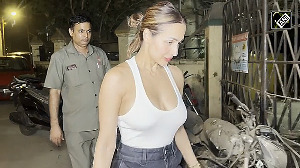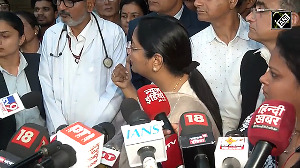Formula One teams will face a cap on expenditure from next year, the governing International Automobile Federation (FIA) said on Thursday.
FIA president Max Mosley confirmed in a letter, sent to all team principals on Wednesday and seen by Reuters, that the cap would apply to all costs "other than engines, drivers and expenditure exclusively for promotion and marketing.
"Because of the variety of arrangements, particularly shareholdings, team principals' remuneration will not be included in the cap," he added.
The arrangements were agreed at a meeting with the teams in Paris on January 11.
Another meeting chaired by former Jaguar team principal Tony Purnell, now working for the FIA as a technical consultant, and attended by a financial representative from each of the 11 teams will be held in Paris on January 31.
Mosley said that the FIA would decide, based on the outcome of that preliminary meeting, on a figure for the budget cap in 2009 and possibly 2010 and 2011.
A financial working group will also be appointed to report in time for detailed regulations to be prepared for June 2008.
CONTROVERSIAL MEASURES
"If the financial working group are unable to devise a satisfactory method of checking expenditure or if a majority of the competing teams do not agree the proposals by June 30, 2008, the cost reduction measures voted by the World Motor Sport Council (on December 7, 2007) will be adopted for 2009 in their entirety," Mosley added.
Those controversial measures included limiting teams to the use of just one wind tunnel and restrictions to prevent them re-deploying staff into computational fluid dynamics.
Some team bosses have already said they are interested in the idea of a budget cap but oppose restrictions in specific areas.
"If a team decides to spend a lot of money on drivers, it should be possible for another team to spend a lot of money on a computer or a wind tunnel," said BMW Sauber boss Mario Theissen this week.
The January 11 meeting also agreed to freeze engine development for five years, rather than 10, from 2008 with all work on the engines ceasing immediately before the season starts in Australia on March 16.
A new engine will then be introduced in 2013.
Mosley said the objectives for this engine would be defined by the FIA before Jan 1, 2009, and were likely to include "low cost, long life, inexpensive running costs for independent teams and consistency with industry requirements for efficiency and low carbon emissions".
The detailed regulations for the new engine and drive train will then be published on June 30, 2010. The total costs of the new engine will also be capped.
"The 2013 engine regulations will also cap both the engine manufacturers' costs for a season and the amount charged for supplying an independent team for a season," said Mosley.
The teams and FIA also agreed that the first engine failure of each car in the 2008 season would not incur the usual 10 place penalty on the starting grid.







 © 2025
© 2025